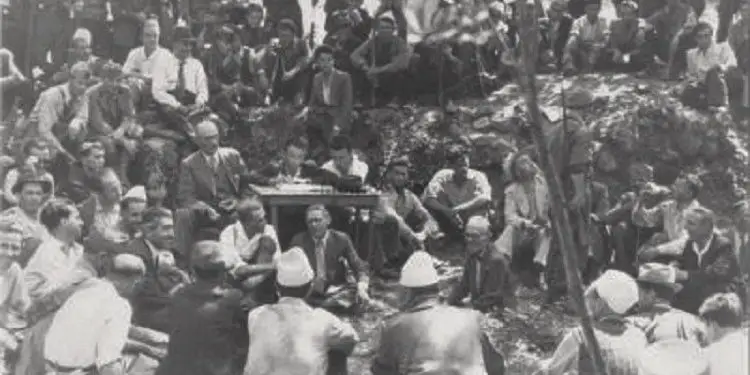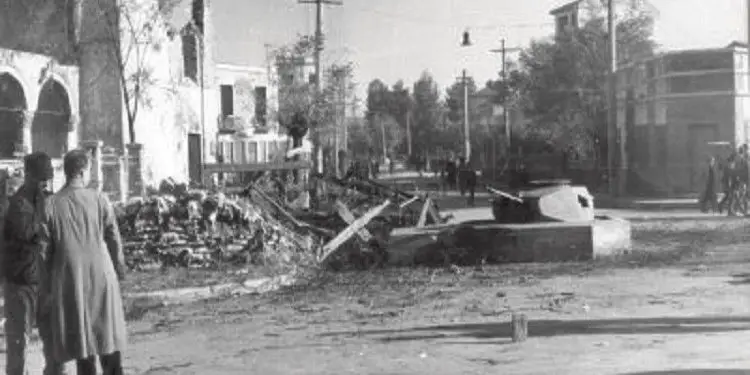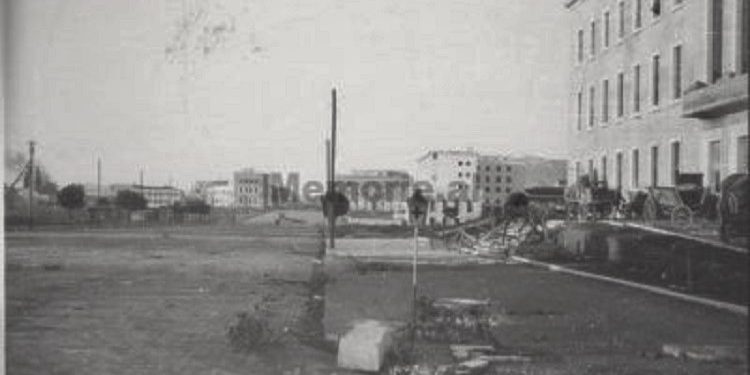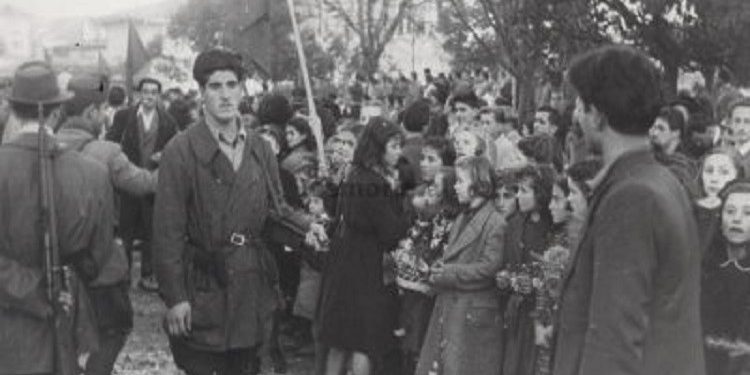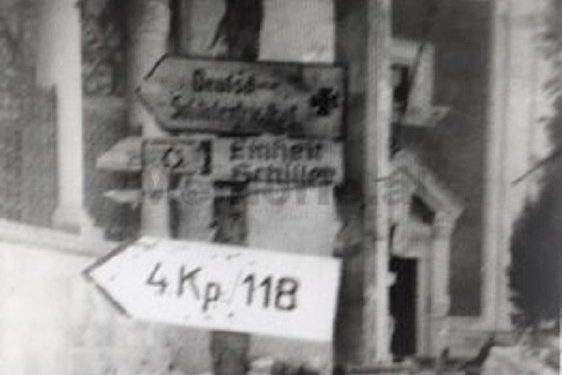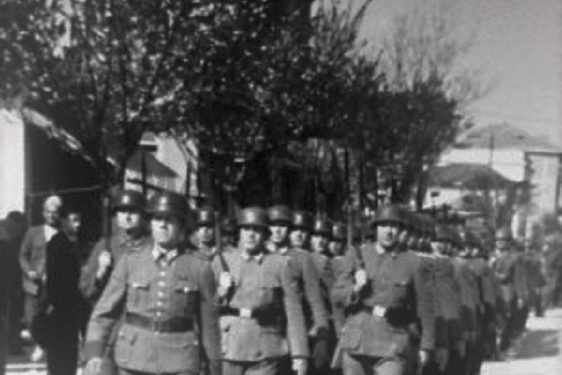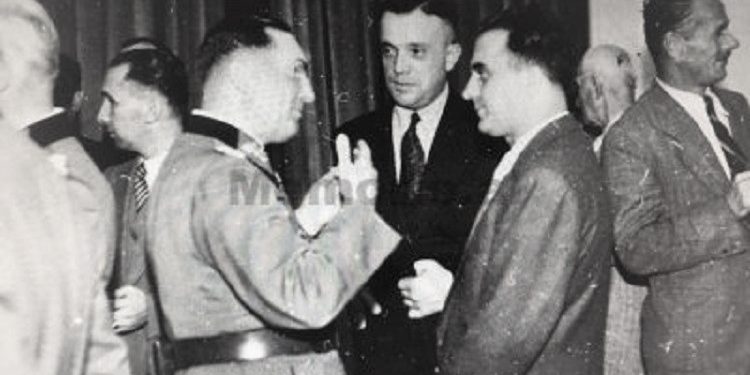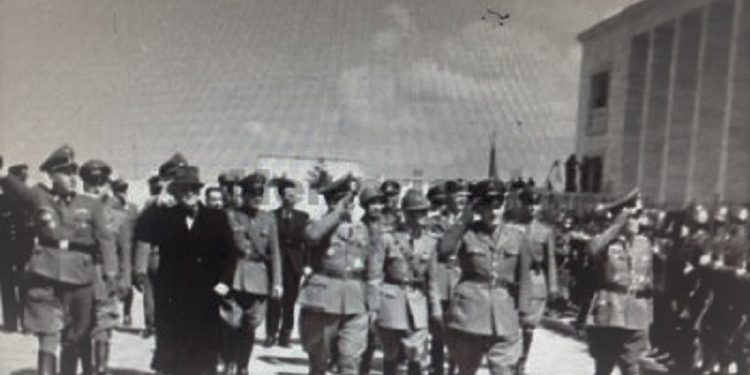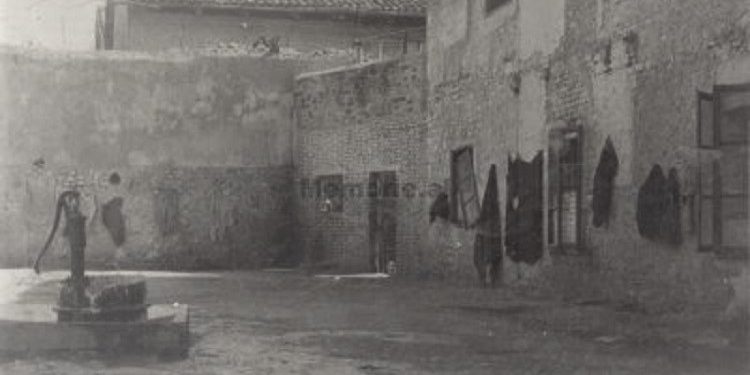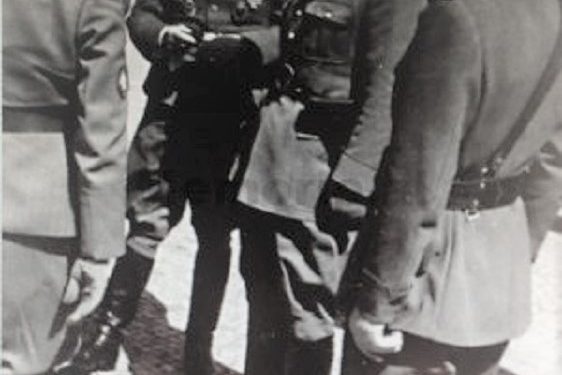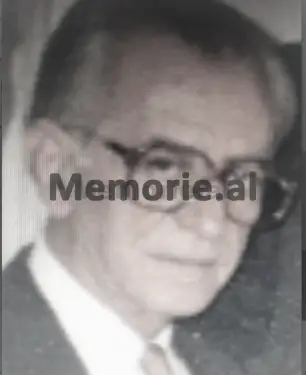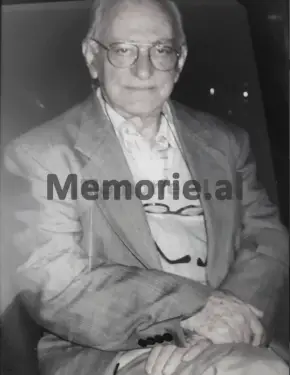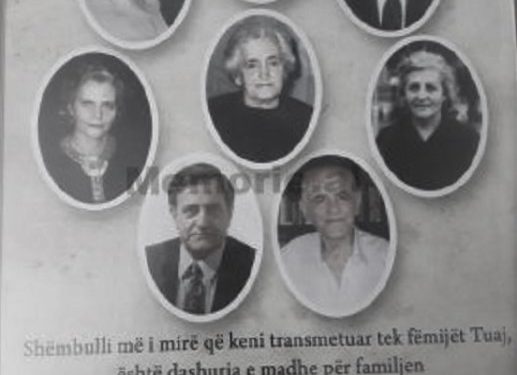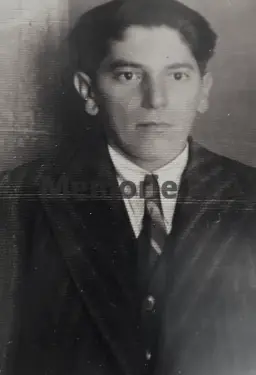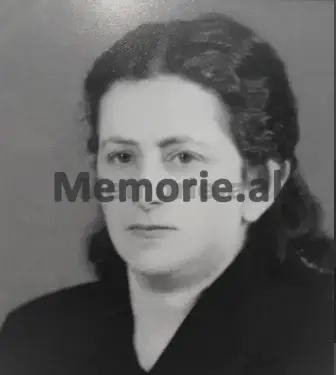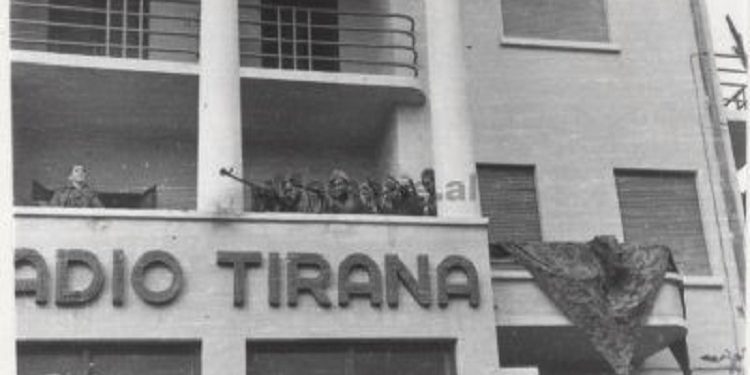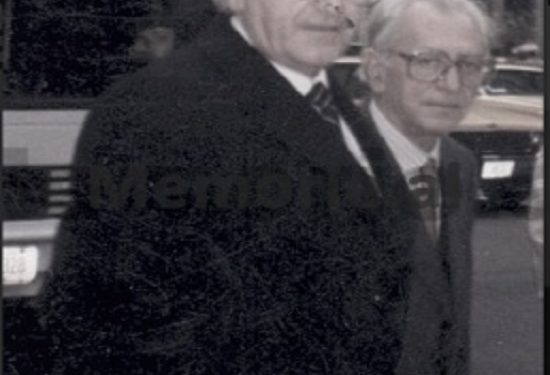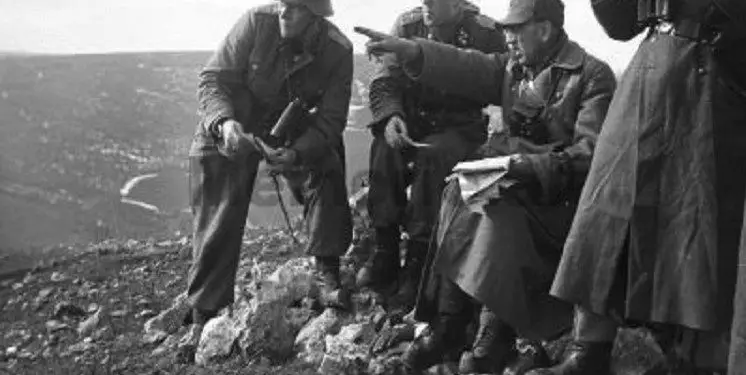Dashnor Kaloçi
Memorie.al/ publishes the testimony of the family members of Hasan Dosti, the former main exponent of the nationalist organization Balli Kombëtar during the war years and chairman of the US Committee “Free Albania”, who on November 16, 1944, German forces executed his wife and brother. How did the incident happen in the house where the Friends lived at the end of Kavaja Street, why did the Germans enter that house and how did the other members of the family escape alive? The unknown event narrated by Viktor Dosti who tells by name and other persons, their neighbors who were executed by German forces in the last moments of their withdrawal from the capital and the event in the Catholic Church of Tirana where Padër Mëshkalla escaped with hundreds of citizens who had entered there to hide from the Germans…
After seeing our uncle, Kutbi, who fell dead in the yard, I immediately went into the laundry of the house and was trying to get out of the flames, our neighbor, Kujtim Libohova (Ismailati), who was one of the sons of that house where we lived for rent. Thinking that the Germans had killed all the people of the house, I climbed up amid the flames checking through the rooms. In the room that was my father’s studio, I found our mother, Fetijen, killed by a barrage of bullets, diagonally to her chest. “With great difficulty I picked up the mother from the corner of the room and put her to bed.” This is how Hasan Dosti’s eldest son, Viktori, recalled that distant event that took place 75 years ago, on November 16, 1944, in connection with the German forces withdrawing from Tirana, which retaliated against the house where they lived. At that time, on Kavaja Street. Regarding that event, which the Dosti family cannot easily forget, as they lost two of the most beloved people of the family (their mother and uncle), the interview of Mr. Viktor Dosti, given to us shortly before he passed away.
Mr. Victor, where did your family live in November 1944, when the Germans shot your mother and uncle?
Our family lived in the house of Agjah Libohova, which is still located on Kavaja Street, opposite the Catholic Church. Well-known lawyer Agjah Libohova, former president of the Court of Dictatorship (Supreme Court) during the Zog Monarchy and the Italian occupation, had been a close friend of our father, Hasan Dosti, and given the fact that we did not have never had a house in Tirana, we lived with him provisionally as tenants. In that house, which was two-story with a garden and a basement, we lived with the family of Agjah Libohova, who had been dead for several years. Our family at that time consisted of ten people and after our uncle, Kutbi (former teacher), who at that time was 36 years old, I was the eldest of the men, (19 years old), after our father, Hasan, had left. From Albania a few days ago.
How do you remember the event of the execution of your mother and uncle by the Germans?
It was November 16, 1944 and in those days the German forces were withdrawing from Tirana towards the North of Albania. The house where we lived was next to Kavaja Street (only a small garden separated it) and from its windows we could see German forces retreating, passing there in armored vehicles, tanks, armored vehicles, carts and on foot. There were two or three days that we watched the German forces passing there incessantly, as a little further down (at Zogu i Zi, where the Tirana Power Plant was located) there was a German post, where they stopped and organized to move onwards. North of the country. Those two or three days the Germans passed freely there on Kavaja Street without being disturbed by anyone, as the partisan forces had not yet entered there.
But in other streets and neighborhoods of Tirana, were there fights in those days between the partisans and the Germans?
Gunshots were heard from all sides, but there was no war on Kavaja Street where we lived. At least we did not see or hear of fighting there in those days. I cannot say for sure if there was a war in the neighborhoods and other streets of Tirana, as we did not leave the house in those days, just to be protected from the bullets that were heard everywhere. However, we had heard that in the last days of October, the war for the liberation of Tirana had begun and the Anglo-American allied aviation had hit those days a German convoy in Musketeers, causing it numerous losses in people and material.
Let’s go back to the day of November 16, when the Germans killed your mother and uncle.
That morning, around 9.00, in the sky of Tirana, a fighter plane was seen leaving in the direction of the North. It was rumored that there was the commander of the German garrison in Tirana, Lederer, who was leaving after the order received from Berlin. After this hour, thinking that there would be bombings, our family, together with that of Agjah Libohova, entered the basement of the house to protect themselves from any bullets that might come. Around lunch, when we, the two families, were still in the basement and sitting down to eat bread, at one point we heard the door slamming, automatic crackling on the stairs, and screams in German. After this moment, some Germans who broke down the door, entered the basement where we were and shouted at us and forced us all out. The moment we went outside, our mother, Fetija, was very worried and one of the German soldiers took a chair and lowered it there to calm her down.
The Germans even came shooting at you with automatic weapons, and calmed you down by sitting your mother in a chair…?!
It sounds incredible, but it really happened. At this time I turned to the German soldiers, asking who knew how to speak French or Italian. Meanwhile, a German soldier came out and said to me in weak French: “By order of the commander, we set fire to the house, but you, as we leave, try to put out the fire. I myself am not German, I am from Alsace-Lorraine (area discussed between France and Germany) and my whole family has been killed. “But do not despair, because the war has these, we have orders to burn all of Tirana.” As I was talking to the German soldier, who let me go from there, his comrades had lined up our two families behind the wall and were getting ready to shoot them. But fortunately, as the Germans left our house without being shot, I immediately climbed to the second floor, trying to put out the fire. My biggest concern was to save the library, which had not yet caught fire, but I could not get many books out, as the smoke would not leave me. As I was trying to put out the fire upstairs on the second floor, I was called from below to sit down, told that another group of Germans had come there. I immediately went downstairs and there a German suddenly grabbed me by the arm and supported me against the wall. After that he took a few steps back, pointing his machine gun at me, ready to shoot me.
What do you feel in those moments?
I looked him straight in the eye and said to myself where that man found the right to kill me. I could not believe that a small bullet coming out of the muzzle of that German soldier could take my life. I was confused and did not feel afraid that I was dying, but I wondered what I felt most sorry for. Surprisingly I felt sorry not for family but for being separated from friends. Apparently the German understood what I was thinking and did not shoot me, but after slapping the machine gun twice at his knees, he left shouting loudly in his own language. As he was leaving, in the yard he met my uncle, Kutbi, who, after snatching his pocket watch from the chain, shot him with automatic volleys, leaving him dead on the spot. At this time I heard the screams of the people of the house. After the automatic burst and screams, silence ensued.
What did you do after your uncle was killed and where were the other family members?
After seeing my uncle fall dead in the yard, I went into the laundry of the house and was trying to get the house boy, Kujtim Libohova (Ismailati) out of the flames. Thinking that all the people of the house had been killed, I climbed up amid the flames checking through the rooms. In the room that was my father’s studio, I found our mother, Fetije, who had been hit by a barrage of bullets diagonally to her chest. With great difficulty I lifted him from the corner of the room and laid him on a bed. While I was checking for others, I went out so careless without thinking that anything would happen. At the end of the yard, behind a plywood, were hidden my two sisters (Tefta and Veronika), as well as Kujtim’s mother and sister. At that time I saw that the uncle of the Libohova family, Namik Jusufati, had also been killed by the German hail. Meanwhile, the Germans who were still in the yard of our house, burned the house in front of us, of Fejzi Alizot, where Zenel Prodan’s family lived for rent. At that moment I ran to the courtyard gate, thinking of going to the other side of the road, to the Catholic Church, but I stopped there at the door, after I saw the German tank on the street. There on the street, next to the gate of our courtyard, was a barricade, which the people had erected with the supporters of the Anti-Fascist Movement, to prevent the withdrawal of the Germans. The Germans came and went in the courtyard of our house, which was still burning, and left only in the dark. When we heard the sound of the tank leaving the road, we got out of where we were hiding and re-entered the basement, where we spent the whole night until morning. There in the basement I saw that my younger sister, Veronica, had also been wounded in the ribs by a bullet and was still bleeding. The next morning, November 17, I took my 6-year-old sister and went to treat her at Dr. Theodhosi, our family doctor, who had the house where today is Mine Peza Street. Along the way two partisans stopped me and asked me where I was going. That same day we buried the three killed in a corner of the yard and after two weeks we took them out again from there and with a cart we took them and buried them at the Tomb of Bami.
Did the Germans retaliate only in your house, or in other houses on Kavaja Street?
The next day, November 17, when the Germans had finally left Tirana, we learned that they had retaliated in other houses on Kavaja Street. They had also killed my classmate, Viktor Bisha (son of the well-known prosecutor Kiço Bisha), who had been executed in front of his mother and sisters. Also, I remember that the moment I had climbed to the second floor to put out the fire, I saw the Germans themselves entering the Catholic Church in front of us, which was full of citizens who had entered there to defend themselves. . That day we learned that Patër Mëshkalla had saved them from being shot, which he confirmed to us years later, when we were together in prison. Before entering the church, the Germans had taken over all the houses on that street in retaliation. All those Germans did it as a sign of revenge for the losses they suffered in Mushqeta and from the blows inflicted on them by the partisans in those days when they were withdrawing from Tirana.
After the end of the War, was anyone interested in that event and did they try to declare them martyrs of the homeland?
The next day, November 17, a person came to our house and asked me and Kujtim Libohova about what had happened. But, given the fact that immediately after the end of the War, our family ended up in prisons and internments, there was no question of our uncle and mother being declared martyrs.
“The German officer, Lyning, apologized to me in Tirana prison”
The testimony of Viktor Dosti, about the Nazi who had fought in the capital
After the event of November 16, 1944, when the German forces withdrawing from Kavaja Street shot Viktor Dosti’s mother and uncle, another event which has remained in the mind and has left a great impression on the eldest son of the Dosti family, is that of happened in Tirana prison in 1945. Regarding this, Viktori recalled: “At that time I was in the new Tirana Prison (today prison 313), because together with a group of friends, such as Petrit Toto, Islam Lleshi, Bujar Doko , Adem Petrela, etc., were accused of participating in the organization of the Youth of Balli Kombëtar during the War period. In the prison where we were, among hundreds of other prisoners, there were also some German soldiers and officers, who had been captured by partisan forces during their withdrawal from Albania in the late autumn of 1944. Among those Germans was also a very charming young man with characteristic Prussian features, whose name was Hans Luning. Although he said that he had been a simple officer during the war, in fact Hans had not been as he claimed, as he had also taken part in the battle of Stalingrad, where he had also injured his left eye. However, we considered him merely a prisoner like all other Germans and had made a very great friendship with Hans, who was more social and spending time with our group than with his compatriots. Likewise, given the fact that he had no outside help, only our group agreed to take any food or any clothing brought to us by the families. It was winter then and I was wearing a big coat, on the collar of which I had put a black ribbon, as a sign of mourning for my mother and uncles who had been killed by the Germans a year earlier. Hans was impressed by the black stripe on the collar of my coat and asked my friends, “What happened to Victor?” After they had told him the whole story, Hansi found the opportunity one day when I was walking down the hall and came out in front of me taking a “ready-to-wear” attitude. After that, he honored me militarily and, extending his hand to me, said: “Victor, thank you very much for your attitude and behavior towards me. Those who killed your mother, uncle, and wounded my sister and burned down the house were my friends. “Thank you very much once again.” This is what the former German officer Hans Luning told me, there in the Tirana prison, who with those words seemed to want to take responsibility for the tragedy that happened to me on the last day of the departure of his friends from Tirana. A few years later, when German prisoners were being removed from the New Tirana Prison, Hansi gave me all the decorations he carefully guarded, which we lost during the numerous checks made on us in camps and prisons. . Although almost 60 years have passed since then, his words still remain in my mind and I will never forget the man for whom I have deep memories and respect “./Memorie.al




